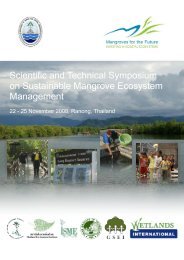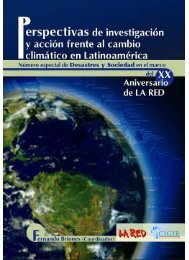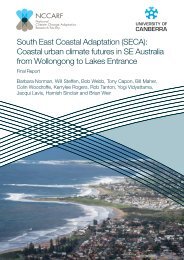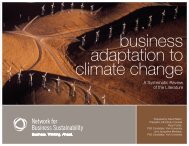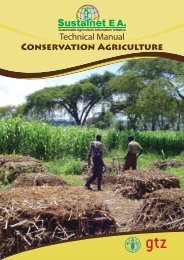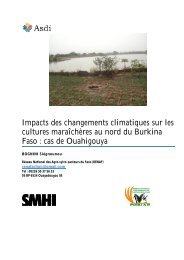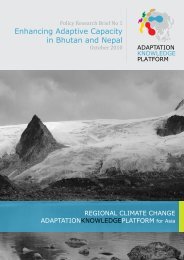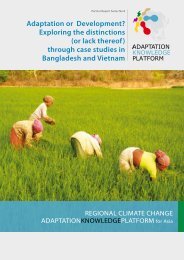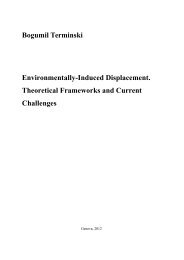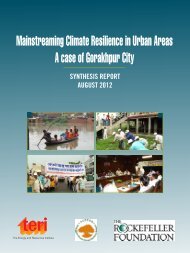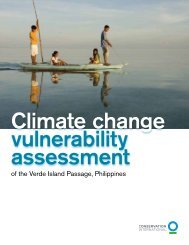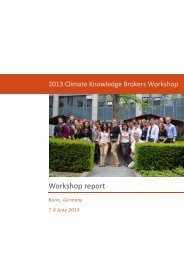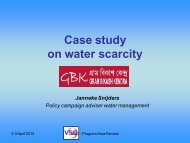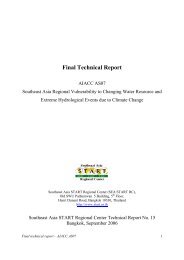<strong>urban</strong> farms. The ‘cost prize squeeze’ refers to a situation where simultaneously thecost of inputs rise, the burdens of regulation increase <strong>and</strong> the market dominance of thesupermarket duopoly in Australia has leads to falling farm gate prices, which result infarmers, specially smaller ones, being driven out of business. One farmer described thedairy sector in these terms:There are basically three sectors in this industry: the good operators, with lowlevels of debt; the good operators, with high levels of debt; <strong>and</strong> those for whomit’s just a struggle. That last group tends to be younger people, <strong>and</strong> they get verylittle returns. The demographics of farmers show that we’re getting older. Theindustry has gone through a huge rationalisation: there were 33,000 dairy farmersin Victoria in the 1970s; now the country as a whole has 17,000. Two-thirds of thedairy farms in Gippsl<strong>and</strong> have disappeared [Farmer, Melbourne].For this farmer, the regulatory burdens constituted ‘death by a thous<strong>and</strong> cuts’:It’s not any one thing – it’s everything together. There’s the cost of rural wages,<strong>and</strong> all the on-costs: super, Workcover, payroll tax. And then there’s taxes ontaxes, like the fire service levy, <strong>and</strong> parental leave. Four departments take theirlevies out of the milk cheque. The carbon tax will impact on our power costs, ourfuel <strong>and</strong> transport. Then we have multiple audits of the milk factory, by the MLA,<strong>and</strong> the EPA, <strong>and</strong> Food St<strong>and</strong>ards. Food safety is necessary, but the red tape isvery difficult. There’s no one-stop department, <strong>and</strong> reform doesn’t happen,because bureaucrats have a vested interest in keeping things the way they are[Farmer, Melbourne].In the same vein, a smaller-scale market gardener from Casey-Cardinia commented onthe pressures <strong>and</strong> burdens she <strong>and</strong> her husb<strong>and</strong> faced in their business:Probably fuel <strong>and</strong> labour costs. Some of the regulations are a fair call, <strong>and</strong> someare simply odd ... Paper shuffling (although necessary to some degree) is timeconsuming <strong>and</strong> not a priority of how we like to run our business, so the less thebetter as our occupation is very physical <strong>and</strong> we are not always educated to dealwith some of the paper <strong>and</strong> jargon related to regulations. I personally thinkAustralia is paranoid about regulations we live in a clean green country <strong>and</strong> Iwould like to see imported produce from China regulated <strong>and</strong> not given r<strong>and</strong>omregulation on a percentage of produce but the whole lot, just like we areaccountable, it is totally contradictory [Market gardener, Melbourne].Similarly, in <strong>and</strong> around the Gold Coast, local growers expressed similar concernsabout the burden of regulation <strong>and</strong> about the low margins that exist for manyproducers. A representative of Queensl<strong>and</strong> farmers observes:It is imperative that famers can compete on an equitable playingfield..[however]..it appears that in recent years the pendulum has swung awayfrom Australian famers [Non-government organisation, Gold Coast].The corporate domination of the Australian <strong>food</strong> system leads to the third barrieridentified by interviewees, namely cultural factors. One is the prevailing culture ofcheap <strong>food</strong>, <strong>and</strong> the convenience of take-away, which can lead to widespreadcomplacency about <strong>food</strong>, its provenance <strong>and</strong> availability as well as about issues ofwaste:<strong>Urban</strong> <strong>food</strong> <strong>security</strong>, <strong>urban</strong> <strong>resilience</strong> <strong>and</strong> <strong>climate</strong> <strong>change</strong> 137
Why do people buy so much <strong>food</strong> that they throw out? Why is there such adisregard for <strong>food</strong>? If you could turn that into dollars, people would certainly havea concern about how much they were throwing away [Local governmentEmployee, Melbourne].People living in cities often face a ‘no time’ or ‘too busy’ culture. The pressuresassociated with social life <strong>and</strong> work may pose a risk to the development of <strong>urban</strong>agriculture, simply because it becomes ‘too hard’:It’s just such a complex issue because people probably would like the idea ofhaving local fresh organic produce but when it comes to the fact that they need toput the effort in they have all these other commitments on their time: they havekids, they have work, they want to watch their favourite TV show - <strong>and</strong> I think youjust have to have a culture <strong>change</strong>, not only on an individual level, you’re going tohave to have it on a business level as well [Micro farmer, Gold Coast].This leads to another aspect of the cultural barrier which participants identified awidespread lack of awareness of the key issues <strong>and</strong> problems concerning the <strong>food</strong>system, <strong>and</strong> engagement with them:There is a real lack of awareness of the need to <strong>change</strong>. Most of the population isnot aware. People need to be more uncomfortable, or have barriers to actionremoved, such as cost incentives. It’s really troubling that so many people don’thave basic <strong>food</strong> growing <strong>and</strong> preparation skills. And this applies across the widerpopulation – we’re lacking basic cooking, <strong>and</strong> <strong>food</strong> preparation, <strong>and</strong> preservingskills. There’s a psychological shift that needs to happen, for people in general tovalue <strong>food</strong> growing as a worthy thing to do. People forget that there’s a farmerbehind every meal they eat [Backyard gardener <strong>and</strong> Permaculturalist,Melbourne].Many interviewees commented that some of the difficulties around <strong>urban</strong> agricultureare related to the fact that most people are simply disconnected from the naturalenvironment:Look, we are so far removed from growing our own <strong>food</strong> <strong>and</strong> being self-sufficientthat people think that it’s disgusting that you grow your own <strong>food</strong>. Like, I’ll bring inmy lettuce or something from home, I’ve had comments from work saying ‘oh,bugs <strong>and</strong> all’ you know ‘oh there’s a bit of dirt on it’. People are so far removedfrom that…people don’t underst<strong>and</strong> that growing your own <strong>food</strong> is a very valuablething to do <strong>and</strong> gives you a sense of pride, they see it as something that only dirtyhippies would do [NGO Employee, Gold Coast].Lack of knowledge <strong>and</strong> information can also be an internal barrier, as even whenpeople are interested in growing their own <strong>food</strong>, they often do not seem to know how toget started:Most of them are totally ignorant. They haven’t got a clue about farmingorganically… It’s quite fascinating <strong>and</strong> really quite amazing. Yeah, a few peoplethink they know a bit but in practise… It’s a difficult thing for people to grasp, theythink that you can just go from chemical to organic <strong>and</strong> there’s a similar solution,it’s just an organic solution [Organic farmer, Gold Coast].<strong>Urban</strong> <strong>food</strong> <strong>security</strong>, <strong>urban</strong> <strong>resilience</strong> <strong>and</strong> <strong>climate</strong> <strong>change</strong> 138
- Page 1 and 2:
Synthesis and Integrative ResearchF
- Page 3 and 4:
Published by the National Climate C
- Page 5 and 6:
ABSTRACTFood security is increasing
- Page 7 and 8:
1. a review of the literature: on n
- Page 9 and 10:
its Food for All project. This help
- Page 13 and 14:
In response to the existential thre
- Page 15 and 16:
2. OBJECTIVES OF THE RESEARCHFood i
- Page 17 and 18:
debates and to the more systematic
- Page 19 and 20:
organisation in the past few years.
- Page 21 and 22:
4. RESULTSIn this section we presen
- Page 23 and 24:
increasing productivity. Thus, whil
- Page 25 and 26:
people and the origins of their foo
- Page 27 and 28:
urban food supply chains. Thus, whi
- Page 29 and 30:
This logistics system is dominated
- Page 31 and 32:
Like Hodgson et al., as per definit
- Page 33 and 34:
esilient, powerful by being locally
- Page 35 and 36:
volume or even its contribution to
- Page 37:
community food growing can have on
- Page 40 and 41:
generations this history has been f
- Page 42 and 43:
a stronger focus on addressing the
- Page 44 and 45:
The third key aspect is fairness -
- Page 46 and 47:
climate (which we live and work in
- Page 48 and 49:
agriculture. Eight percent is in ur
- Page 50 and 51:
This concept of the ‘spaces in be
- Page 52 and 53:
esearch scientist and chair of the
- Page 54 and 55:
As discussed above, protection of t
- Page 56:
4.2.5 What is the extent and the im
- Page 60 and 61:
no place under the panoply of pract
- Page 62 and 63:
increased, the market dominance of
- Page 64 and 65:
… the residents of S Park called
- Page 66 and 67:
5. CONCLUSIONSThere is growing conc
- Page 68 and 69:
urban resilience. This inevitably c
- Page 70 and 71:
In many respects these contrasting
- Page 72 and 73:
Many interviewees of both standpoin
- Page 74 and 75:
a given area. The rationale for thi
- Page 76 and 77:
mapping the location of sources of
- Page 78 and 79:
Australian food policy debates refl
- Page 80 and 81:
APPENDIX 1: URBAN FOOD SECURITY, UR
- Page 82 and 83:
IntroductionGlobally, and in Austra
- Page 84 and 85:
Review methodsThis stage of the res
- Page 86 and 87:
despite many of the causes of food
- Page 88 and 89:
…by 2050… food production will
- Page 90 and 91:
2. How is food security (in general
- Page 92 and 93:
the food security of cities, but no
- Page 94 and 95:
While some see the density of devel
- Page 96 and 97: when suppliers, distributors, and c
- Page 98 and 99: a more prominent role in enhancing
- Page 100 and 101: community gardens webpage on the Co
- Page 102 and 103: comprehensive description of the ca
- Page 104 and 105: In both the developed and developin
- Page 106 and 107: Their review notes a significant in
- Page 108 and 109: lines of supply from often rural pl
- Page 110 and 111: 1 IntroductionCities have always be
- Page 112 and 113: Despite some attempts to curb urban
- Page 114 and 115: the Gold Coast remains a city that
- Page 116 and 117: ackyard/community gardenernot affil
- Page 118 and 119: level in local government. VicHealt
- Page 120: Figure 2: Impacts on Municipal Food
- Page 125 and 126: security I recognise that the cost
- Page 127 and 128: United States, he offered the follo
- Page 129 and 130: This vision highlights the multi-fu
- Page 131 and 132: An environmental education centre.
- Page 133 and 134: Melbourne Food ForestA Melbourne ga
- Page 135 and 136: stakeholder consultations, the repo
- Page 137 and 138: can. We sense the changes. The earl
- Page 139 and 140: half-desert environments. We’re g
- Page 141 and 142: etain its basic function and struct
- Page 143 and 144: government; and that trying to get
- Page 145: the north and the west, where it wo
- Page 149 and 150: urban agriculture (however broadly
- Page 151 and 152: enefits and risks. Before we can co
- Page 153 and 154: Another important and tangible role
- Page 155 and 156: coast without any problems whatsoev
- Page 157 and 158: BIBLIOGRAPHYAECOM (2011) Scoping St
- Page 159 and 160: Burns, C. I., A. (2007). Measuring
- Page 161 and 162: Edwards, F., & Mercer, D. (2010). M
- Page 163 and 164: James, S. O’Neill, P. and Dimeski
- Page 165 and 166: Millar, R., 2012, ‘Government shi
- Page 167 and 168: Saltmarsh, N. M., J; Longhurst, N.
- Page 169 and 170: Walker B., 2008, Resilience Thinkin



